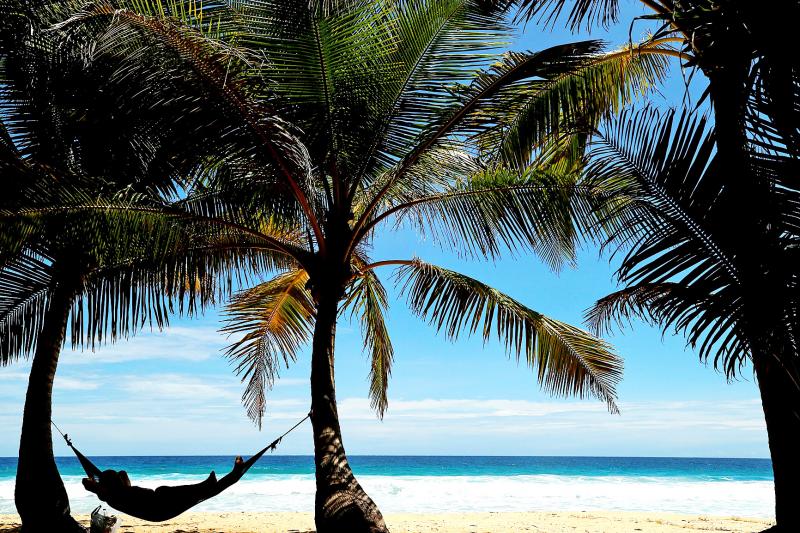Thailand plans to fully reopen to vaccinated tourists from countries deemed low risk from Nov. 1, the country’s leader said on Monday, citing the urgent need to save the kingdom’s ailing economy.
Before the COVID-19 pandemic, Thailand attracted nearly 40 million visitors a year drawn to its picturesque beaches and robust nightlife, with tourism making up almost 20 percent of its national income.
However, pandemic-related travel restrictions have left the economy battered, contributing to its worst performance in more than 20 years.

Photo: Reuters
Thai Prime Minister Prayuth Chan-ocha announced that the country would be reopening its borders to vaccinated tourists travelling by air from “low-risk countries.”
Of the 10 nations considered low risk, Prayuth named only China, Germany, Singapore, the UK and the US.
“When they arrive, they should present a [negative] COVID test ... and test once again upon arrival,” the prime minister said in a televised address.
After getting a negative test, “they can travel freely like Thais,” he said.
His announcement significantly loosens up current restrictions in place for vaccinated tourists, who must undergo at least seven days of hotel quarantine.
Thailand’s so-called “sandbox” scheme in Phuket — which allows vaccinated tourists to move freely around the popular beach island — requires them to remain there for a week.
Visitors outside of Thailand’s designated 10 low-risk countries are welcome, “but they have to be in quarantine,” Prayuth said, adding that more nations would be added to the greenlit list in December.
Earlier this year, Prayuth had vowed the country would reopen this month, saying that its vaccination campaign would be sped up to reach 70 percent of the population.
To date, 48 percent of Thais nationwide have received at least a single vaccine dose, while more than 30 percent have received two doses, health officials said on Monday.
The capital, Bangkok — once famed for its nightlife — is still under a nighttime curfew, as well as a booze ban in bars and restaurants.
Prayuth said authorities would “consider allowing alcoholic drinks in restaurants and reopening entertainment venues under strict health measures” during the New Year’s Eve period — previously a money-maker for the kingdom’s tourism sector.
He acknowledged his decision to reopen in less than a month came with the risk of more COVID-19 cases.
“But I think the people will not be able to stand it if they have to lose a second chance at this business opportunity,” he said, pointing to countries like the UK and Australia loosening their travel restrictions.
“The time has come for us to ready ourselves to face the coronavirus and live with it ... much as we have learned to live with other diseases with treatments and vaccinations,” he said.
Last year, Thailand lost about US$50 billion in tourism revenue as foreign arrivals plunged 83 percent to 6.7 million, from a record 39.9 million two years ago.
The kingdom is still registering about 10,000 new cases a day — largely fueled by the highly contagious Delta variant of SARS-CoV-2. It has more than 1.7 million cases to date and has recorded 17,751 dead.
Additional reporting by staff writer

A fire caused by a burst gas pipe yesterday spread to several homes and sent a fireball soaring into the sky outside Malaysia’s largest city, injuring more than 100 people. The towering inferno near a gas station in Putra Heights outside Kuala Lumpur was visible for kilometers and lasted for several hours. It happened during a public holiday as Muslims, who are the majority in Malaysia, celebrate the second day of Eid al-Fitr. National oil company Petronas said the fire started at one of its gas pipelines at 8:10am and the affected pipeline was later isolated. Disaster management officials said shutting the

US Vice President J.D. Vance on Friday accused Denmark of not having done enough to protect Greenland, when he visited the strategically placed and resource-rich Danish territory coveted by US President Donald Trump. Vance made his comment during a trip to the Pituffik Space Base in northwestern Greenland, a visit viewed by Copenhagen and Nuuk as a provocation. “Our message to Denmark is very simple: You have not done a good job by the people of Greenland,” Vance told a news conference. “You have under-invested in the people of Greenland, and you have under-invested in the security architecture of this

UNREST: The authorities in Turkey arrested 13 Turkish journalists in five days, deported a BBC correspondent and on Thursday arrested a reporter from Sweden Waving flags and chanting slogans, many hundreds of thousands of anti-government demonstrators on Saturday rallied in Istanbul, Turkey, in defence of democracy after the arrest of Istanbul Mayor Ekrem Imamoglu which sparked Turkey’s worst street unrest in more than a decade. Under a cloudless blue sky, vast crowds gathered in Maltepe on the Asian side of Turkey’s biggest city on the eve of the Eid al-Fitr celebration which started yesterday, marking the end of Ramadan. Ozgur Ozel, chairman of the main opposition Republican People’s Party (CHP), which organized the rally, said there were 2.2 million people in the crowd, but

JOINT EFFORTS: The three countries have been strengthening an alliance and pressing efforts to bolster deterrence against Beijing’s assertiveness in the South China Sea The US, Japan and the Philippines on Friday staged joint naval drills to boost crisis readiness off a disputed South China Sea shoal as a Chinese military ship kept watch from a distance. The Chinese frigate attempted to get closer to the waters, where the warships and aircraft from the three allied countries were undertaking maneuvers off the Scarborough Shoal — also known as Huangyan Island (黃岩島) and claimed by Taiwan and China — in an unsettling moment but it was warned by a Philippine frigate by radio and kept away. “There was a time when they attempted to maneuver